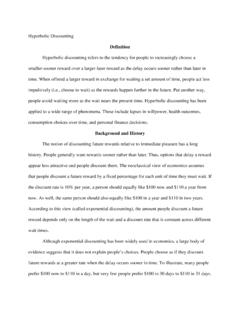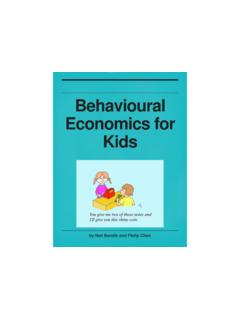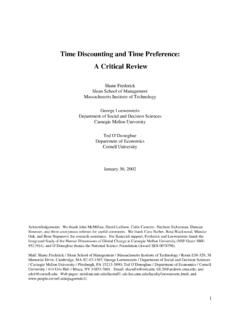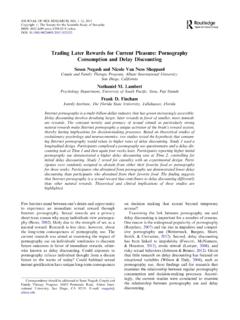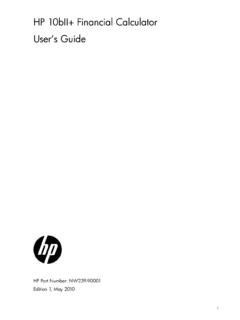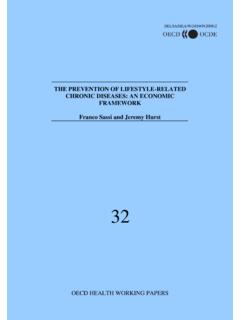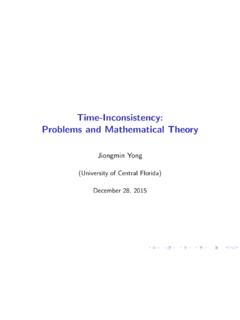Transcription of Making Financial Education More Effective: Lessons From ...
1 Making Financial Education more effective : Lessons From Behavioral Economics Joanne Yoong Prepared for the OECD-Bank of Italy International Symposium on Financial Literacy June 2010 Overview Project background and objective Selective substantive review Financial Education in the OECD and beyond Behavioral economics and personal finance Applying behavioral economics to Financial Education Takeup and completion Content, delivery and retention Achieving and sustaining behavior change Other behaviorally-motivated approaches Product design to promote healthy Financial choices Disclosures and regulation to prevent poor decision Making Concluding remarks: moving forward through complementarity Project Background and Objective Awareness of the need for individual Financial capability is growing Environmental challenges.
2 Short and long-term trends in the Financial markets, international pension system reforms Increasing evidence that consumers lack Financial skills Many national and international public and private initiatives The OECD Financial Education Project was launched in 2003 Workshops, research reviews, reports and best practice recommendations on key issues International Network on Financial Education (2008): more than 135 institutions in 64 countries Coordinating efforts to develop an international methodology and guide for systematic and comparable evaluation of Financial Education projects This paper: OECD seeks to explore ways in which insights from behavioral economics can make Financial Education more effective What Do We Mean By Financial Education ?
3 OECD(2005): Financial Education is the process by which consumers improve understanding of Financial products, concepts and risks and through information, instruction and/or objective advice, develop the skills and confidence to become more aware of ( Financial ) risks and opportunities, make informed choices, know where to go for help, and take other effective actions to improve their Financial well-being. Large and growing number of programmes, including crisis response Main topics tend to be savings/investment, credit, inclusion But incredible diversity in goals, scope, form Aims : from promoting awareness to altering behavior Providers: schools, employers, NGOs, private firms, governments Delivery.
4 From brochures, websites to seminars, training courses A Clear and Consistent International Policy Need Many consumers have limited Financial literacy/capability Less than 10% of US households able to answer questions about compound interest, inflation, risk diversification more than 60% of UK households have at least one area of weakness Yet a significant number are also overconfident about their abilities Almost 40% of US households rated knowledge as high or very high 15% of Dutch households report that they do not need more Financial information but have poor measured Financial knowledge Across all countries, important socioeconomic disparities exist.
5 Especially with respect to income and Education Can be related to three important challenges for Financial Education Pressure to deliver short-term change Lack of consumer motivation and counterproductive biases No one size fits all model for either content or form: need for appropriate targeting But What Has Financial Education Delivered? Early studies found that Financial Education in schools and workplaces improved Financial behavior, but recent work is more mixed Robust literature finds that Financial Education positively affects knowledge and intended behavioral change, and Financial knowledge is strongly associated with better Financial behavior Fewer studies have demonstrated a convincing direct link between Financial Education and actual behavior change, and measured effects can be relatively small Moreover.
6 Financial Education may increase confidence without increasing skills Is it fair to say that Financial Education is costly and does not work ? Not a generic intervention Lack of conclusive evidence partly due to the diverse nature of programmes and extent / quality of evaluation Debate over different approaches, particularly alternative solutions based on behavioral economics Why Does Behavioral Economics Matter? Economists model behavior by Making assumptions about how people make choices. In standard neoclassical models, rational agents make decisions that maximize their private utility, based on all available information Of course, naturally!
7 Why not? Why Does Behavioral Economics Matter? Behavioral economists contend that people deviate from these standard assumptions in ways that are systematic and significant Can be measured and modeled using insights from psychology, cognitive science and biology Have strong and testable implications for choice Behavioral economics is important because Incorporating predictable irrationality into standard economic frameworks allows us to better analyze (and predict) choices Policy interventions that better account for human nature can more effectively transform behavior A Simple Framework For Thinking About Departures from The Standard Model My individual utility is based on preferences that are consistent across time and independent of context My beliefs perfectly rationalize and use all available information My decision process is to maximize the expected value of my private utility My choice is optimal for my well-being.
8 Given the available information and resources Common assumptions Some Implications for Household Finance: Non-standard Preferences Time-Inconsistency: Hyperbolic Discounting Present bias and self-control problems: Failure to stick to plans undersave / overborrow Procrastination and inertia: Small frictions prevent actions plan participation, opting-out of teaser rate offers Some Implications for Household Finance: Non-standard Preferences Time-Inconsistency: Hyperbolic Discounting Present bias and self-control problems: Failure to stick to plans undersave / overborrow Procrastination and inertia: Small frictions prevent actions plan participation, opting-out of teaser rate offers Reference-Dependence Loss aversion, endowment effects, status quo bias: Perverse asset trading decisions sell too fast during crisis and then buy back too late Narrow framing and mental accounting.
9 Tendency to treat choices/resources in isolation and by type annuitization takeup Some Implications for Household Finance: Non-standard Preferences Time-Inconsistency: Hyperbolic Discounting Present bias and self-control problems: Failure to stick to plans undersave / overborrow Procrastination and inertia: Small frictions prevent actions plan participation, opting-out of teaser rate offers Reference-Dependence Loss aversion, endowment effects, status quo bias: Perverse asset trading decisions sell too fast during crisis and then buy back too late Narrow framing and mental accounting: Tendency to treat choices/resources in isolation and by type annuitization takeup Social Preferences Social interaction or peer effects: Direct pressure or indirect desires for conformity/identity face-to-face solicitations, keeping up with the Joneses Socially-defined values.
10 Altruism, reciprocity equity charitable giving, tax compliance Some Implications for Household Finance: Non-standard Beliefs Overconfidence Overestimation of own ability: Excessive risk-taking stock market investing Underestimation of own weaknesses: Tendency to be na ve about own biases and fallibility self-control problems Overconfidence in affiliated others: Tendency to overestimate others to whom one is related Excessive investment in employer stock at the c










